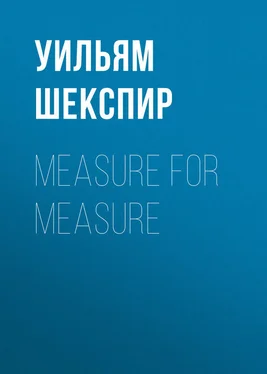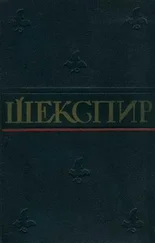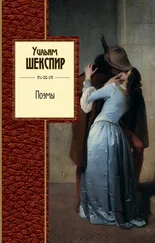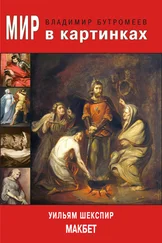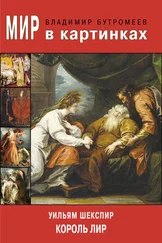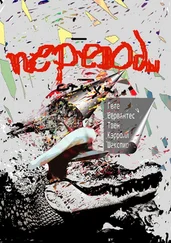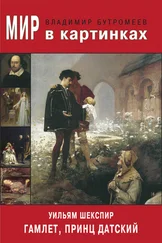Уильям Шекспир - Measure for Measure
Здесь есть возможность читать онлайн «Уильям Шекспир - Measure for Measure» — ознакомительный отрывок электронной книги совершенно бесплатно, а после прочтения отрывка купить полную версию. В некоторых случаях можно слушать аудио, скачать через торрент в формате fb2 и присутствует краткое содержание. Жанр: Европейская старинная литература, Драматургия, foreign_dramaturgy, на английском языке. Описание произведения, (предисловие) а так же отзывы посетителей доступны на портале библиотеки ЛибКат.
- Название:Measure for Measure
- Автор:
- Жанр:
- Год:неизвестен
- ISBN:нет данных
- Рейтинг книги:4 / 5. Голосов: 1
-
Избранное:Добавить в избранное
- Отзывы:
-
Ваша оценка:
- 80
- 1
- 2
- 3
- 4
- 5
Measure for Measure: краткое содержание, описание и аннотация
Предлагаем к чтению аннотацию, описание, краткое содержание или предисловие (зависит от того, что написал сам автор книги «Measure for Measure»). Если вы не нашли необходимую информацию о книге — напишите в комментариях, мы постараемся отыскать её.
Measure for Measure — читать онлайн ознакомительный отрывок
Ниже представлен текст книги, разбитый по страницам. Система сохранения места последней прочитанной страницы, позволяет с удобством читать онлайн бесплатно книгу «Measure for Measure», без необходимости каждый раз заново искать на чём Вы остановились. Поставьте закладку, и сможете в любой момент перейти на страницу, на которой закончили чтение.
Интервал:
Закладка:
SCENE IV. A nunnery
Enter ISABELLA and FRANCISCA
ISABELLA. And have you nuns no farther privileges?
FRANCISCA. Are not these large enough?
ISABELLA. Yes, truly; I speak not as desiring more,
But rather wishing a more strict restraint
Upon the sisterhood, the votarists of Saint Clare.
LUCIO. [ Within] Ho! Peace be in this place!
ISABELLA. Who's that which calls?
FRANCISCA. It is a man's voice. Gentle Isabella,
Turn you the key, and know his business of him:
You may, I may not; you are yet unsworn;
When you have vow'd, you must not speak with men
But in the presence of the prioress;
Then, if you speak, you must not show your face,
Or, if you show your face, you must not speak.
He calls again; I pray you answer him. Exit FRANCISCA
ISABELLA. Peace and prosperity! Who is't that calls?
Enter LUCIO
LUCIO. Hail, virgin, if you be, as those cheek-roses
Proclaim you are no less. Can you so stead me
As bring me to the sight of Isabella,
A novice of this place, and the fair sister
To her unhappy brother Claudio?
ISABELLA. Why her 'unhappy brother'? Let me ask
The rather, for I now must make you know
I am that Isabella, and his sister.
LUCIO. Gentle and fair, your brother kindly greets you.
Not to be weary with you, he's in prison.
ISABELLA. Woe me! For what?
LUCIO. For that which, if myself might be his judge,
He should receive his punishment in thanks:
He hath got his friend with child.
ISABELLA. Sir, make me not your story.
LUCIO. It is true.
I would not- though 'tis my familiar sin
With maids to seem the lapwing, and to jest,
Tongue far from heart- play with all virgins so:
I hold you as a thing enskied and sainted,
By your renouncement an immortal spirit,
And to be talk'd with in sincerity,
As with a saint.
ISABELLA. You do blaspheme the good in mocking me.
LUCIO. Do not believe it. Fewness and truth, 'tis thus:
Your brother and his lover have embrac'd.
As those that feed grow full, as blossoming time
That from the seedness the bare fallow brings
To teeming foison, even so her plenteous womb
Expresseth his full tilth and husbandry.
ISABELLA. Some one with child by him? My cousin Juliet?
LUCIO. Is she your cousin?
ISABELLA. Adoptedly, as school-maids change their names
By vain though apt affection.
LUCIO. She it is.
ISABELLA. O, let him marry her!
LUCIO. This is the point.
The Duke is very strangely gone from hence;
Bore many gentlemen, myself being one,
In hand, and hope of action; but we do learn,
By those that know the very nerves of state,
His givings-out were of an infinite distance
From his true-meant design. Upon his place,
And with full line of his authority,
Governs Lord Angelo, a man whose blood
Is very snow-broth, one who never feels
The wanton stings and motions of the sense,
But doth rebate and blunt his natural edge
With profits of the mind, study and fast.
He- to give fear to use and liberty,
Which have for long run by the hideous law,
As mice by lions- hath pick'd out an act
Under whose heavy sense your brother's life
Falls into forfeit; he arrests him on it,
And follows close the rigour of the statute
To make him an example. All hope is gone,
Unless you have the grace by your fair prayer
To soften Angelo. And that's my pith of business
'Twixt you and your poor brother.
ISABELLA. Doth he so seek his life?
LUCIO. Has censur'd him
Already, and, as I hear, the Provost hath
A warrant for his execution.
ISABELLA. Alas! what poor ability's in me
To do him good?
LUCIO. Assay the pow'r you have.
ISABELLA. My power, alas, I doubt!
LUCIO. Our doubts are traitors,
And make us lose the good we oft might win
By fearing to attempt. Go to Lord Angelo,
And let him learn to know, when maidens sue,
Men give like gods; but when they weep and kneel,
All their petitions are as freely theirs
As they themselves would owe them.
ISABELLA. I'll see what I can do.
LUCIO. But speedily.
ISABELLA. I will about it straight;
No longer staying but to give the Mother
Notice of my affair. I humbly thank you.
Commend me to my brother; soon at night
I'll send him certain word of my success.
LUCIO. I take my leave of you.
ISABELLA. Good sir, adieu. Exeunt
ACT II. Scene I. A hall in ANGELO'S house
Enter ANGELO, ESCALUS, a JUSTICE, PROVOST, OFFICERS, and other
ATTENDANTS
ANGELO. We must not make a scarecrow of the law,
Setting it up to fear the birds of prey,
And let it keep one shape till custom make it
Their perch, and not their terror.
ESCALUS. Ay, but yet
Let us be keen, and rather cut a little
Than fall and bruise to death. Alas! this gentleman,
Whom I would save, had a most noble father.
Let but your honour know,
Whom I believe to be most strait in virtue,
That, in the working of your own affections,
Had time coher'd with place, or place with wishing,
Or that the resolute acting of our blood
Could have attain'd th' effect of your own purpose
Whether you had not sometime in your life
Err'd in this point which now you censure him,
And pull'd the law upon you.
ANGELO. 'Tis one thing to be tempted, Escalus,
Another thing to fall. I not deny
The jury, passing on the prisoner's life,
May in the sworn twelve have a thief or two
Guiltier than him they try. What's open made to justice,
That justice seizes. What knows the laws
That thieves do pass on thieves? 'Tis very pregnant,
The jewel that we find, we stoop and take't,
Because we see it; but what we do not see
We tread upon, and never think of it.
You may not so extenuate his offence
For I have had such faults; but rather tell me,
When I, that censure him, do so offend,
Let mine own judgment pattern out my death,
And nothing come in partial. Sir, he must die.
ESCALUS. Be it as your wisdom will.
ANGELO. Where is the Provost?
PROVOST. Here, if it like your honour.
ANGELO. See that Claudio
Be executed by nine to-morrow morning;
Bring him his confessor; let him be prepar'd;
For that's the utmost of his pilgrimage. Exit PROVOST
ESCALUS. [Aside] Well, heaven forgive him! and forgive us all!
Some rise by sin, and some by virtue fall;
Some run from breaks of ice, and answer none,
And some condemned for a fault alone.
Enter ELBOW and OFFICERS with FROTH and POMPEY
ELBOW. Come, bring them away; if these be good people in a commonweal that do nothing but use their abuses in common houses, I know no law; bring them away. ANGELO. How now, sir! What's your name, and what's the matter? ELBOW. If it please your honour, I am the poor Duke's constable, and my name is Elbow; I do lean upon justice, sir, and do bring in here before your good honour two notorious benefactors. ANGELO. Benefactors! Well- what benefactors are they? Are they not malefactors? ELBOW. If it please your honour, I know not well what they are; but precise villains they are, that I am sure of, and void of all profanation in the world that good Christians ought to have. ESCALUS. This comes off well; here's a wise officer. ANGELO. Go to; what quality are they of? Elbow is your name? Why dost thou not speak, Elbow? POMPEY. He cannot, sir; he's out at elbow. ANGELO. What are you, sir? ELBOW. He, sir? A tapster, sir; parcel-bawd; one that serves a bad woman; whose house, sir, was, as they say, pluck'd down in the suburbs; and now she professes a hot-house, which, I think, is a very ill house too. ESCALUS. How know you that? ELBOW. My Wife, sir, whom I detest before heaven and your honour- ESCALUS. How! thy wife! ELBOW. Ay, sir; whom I thank heaven, is an honest woman- ESCALUS. Dost thou detest her therefore? ELBOW. I say, sir, I will detest myself also, as well as she, that this house, if it be not a bawd's house, it is pity of her life, for it is a naughty house. ESCALUS. How dost thou know that, constable? ELBOW. Marry, sir, by my wife; who, if she had been a woman cardinally given, might have been accus'd in fornication, adultery, and all uncleanliness there. ESCALUS. By the woman's means? ELBOW. Ay, sir, by Mistress Overdone's means; but as she spit in his face, so she defied him. POMPEY. Sir, if it please your honour, this is not so. ELBOW. Prove it before these varlets here, thou honourable man, prove it. ESCALUS. Do you hear how he misplaces? POMPEY. Sir, she came in great with child; and longing, saving your honour's reverence, for stew'd prunes. Sir, we had but two in the house, which at that very distant time stood, as it were, in a fruit dish, a dish of some three pence; your honours have seen such dishes; they are not China dishes, but very good dishes. ESCALUS. Go to, go to; no matter for the dish, sir. POMPEY. No, indeed, sir, not of a pin; you are therein in the right; but to the point. As I say, this Mistress Elbow, being, as I say, with child, and being great-bellied, and longing, as I said, for prunes; and having but two in the dish, as I said, Master Froth here, this very man, having eaten the rest, as I said, and, as I say, paying for them very honestly; for, as you know, Master Froth, I could not give you three pence again- FROTH. No, indeed. POMPEY. Very well; you being then, if you be rememb'red, cracking the stones of the foresaid prunes- FROTH. Ay, so I did indeed. POMPEY. Why, very well; I telling you then, if you be rememb'red, that such a one and such a one were past cure of the thing you wot of, unless they kept very good diet, as I told you- FROTH. All this is true. POMPEY. Why, very well then- ESCALUS. Come, you are a tedious fool. To the purpose: what was done to Elbow's wife that he hath cause to complain of? Come me to what was done to her. POMPEY. Sir, your honour cannot come to that yet. ESCALUS. No, sir, nor I mean it not. POMPEY. Sir, but you shall come to it, by your honour's leave. And, I beseech you, look into Master Froth here, sir, a man of fourscore pound a year; whose father died at Hallowmas- was't not at Hallowmas, Master Froth? FROTH. All-hallond eve. POMPEY. Why, very well; I hope here be truths. He, sir, sitting, as I say, in a lower chair, sir; 'twas in the Bunch of Grapes, where, indeed, you have a delight to sit, have you not? FROTH. I have so; because it is an open room, and good for winter. POMPEY. Why, very well then; I hope here be truths. ANGELO. This will last out a night in Russia, When nights are longest there; I'll take my leave, And leave you to the hearing of the cause, Hoping you'll find good cause to whip them all. ESCALUS. I think no less. Good morrow to your lordship. [Exit ANGELO] Now, sir, come on; what was done to Elbow's wife, once more? POMPEY. Once? – sir. There was nothing done to her once. ELBOW. I beseech you, sir, ask him what this man did to my wife. POMPEY. I beseech your honour, ask me. ESCALUS. Well, sir, what did this gentleman to her? POMPEY. I beseech you, sir, look in this gentleman's face. Good Master Froth, look upon his honour; 'tis for a good purpose. Doth your honour mark his face? ESCALUS. Ay, sir, very well. POMPEY. Nay, I beseech you, mark it well. ESCALUS. Well, I do so. POMPEY. Doth your honour see any harm in his face? ESCALUS. Why, no. POMPEY. I'll be suppos'd upon a book his face is the worst thing about him. Good then; if his face be the worst thing about him, how could Master Froth do the constable's wife any harm? I would know that of your honour. ESCALUS. He's in the right, constable; what say you to it? ELBOW. First, an it like you, the house is a respected house; next, this is a respected fellow; and his mistress is a respected woman. POMPEY. By this hand, sir, his wife is a more respected person than any of us all. ELBOW. Varlet, thou liest; thou liest, wicket varlet; the time is yet to come that she was ever respected with man, woman, or child. POMPEY. Sir, she was respected with him before he married with her. ESCALUS. Which is the wiser here, Justice or Iniquity? Is this true? ELBOW. O thou caitiff! O thou varlet! O thou wicked Hannibal! I respected with her before I was married to her! If ever I was respected with her, or she with me, let not your worship think me the poor Duke's officer. Prove this, thou wicked Hannibal, or I'll have mine action of batt'ry on thee. ESCALUS. If he took you a box o' th' ear, you might have your action of slander too. ELBOW. Marry, I thank your good worship for it. What is't your worship's pleasure I shall do with this wicked caitiff? ESCALUS. Truly, officer, because he hath some offences in him that thou wouldst discover if thou couldst, let him continue in his courses till thou know'st what they are. ELBOW. Marry, I thank your worship for it. Thou seest, thou wicked varlet, now, what's come upon thee: thou art to continue now, thou varlet; thou art to continue. ESCALUS. Where were you born, friend? FROTH. Here in Vienna, sir. ESCALUS. Are you of fourscore pounds a year? FROTH. Yes, an't please you, sir. ESCALUS. So. What trade are you of, sir? POMPEY. A tapster, a poor widow's tapster. ESCALUS. Your mistress' name? POMPEY. Mistress Overdone. ESCALUS. Hath she had any more than one husband? POMPEY. Nine, sir; Overdone by the last. ESCALUS. Nine! Come hither to me, Master Froth. Master Froth, I would not have you acquainted with tapsters: they will draw you, Master Froth, and you will hang them. Get you gone, and let me hear no more of you. FROTH. I thank your worship. For mine own part, I never come into any room in a taphouse but I am drawn in. ESCALUS. Well, no more of it, Master Froth; farewell. [Exit FROTH] Come you hither to me, Master Tapster; what's your name, Master Tapster? POMPEY. Pompey. ESCALUS. What else? POMPEY. Bum, sir. ESCALUS. Troth, and your bum is the greatest thing about you; so that, in the beastliest sense, you are Pompey the Great. Pompey, you are partly a bawd, Pompey, howsoever you colour it in being a tapster. Are you not? Come, tell me true; it shall be the better for you. POMPEY. Truly, sir, I am a poor fellow that would live. ESCALUS. How would you live, Pompey- by being a bawd? What do you think of the trade, Pompey? Is it a lawful trade? POMPEY. If the law would allow it, sir. ESCALUS. But the law will not allow it, Pompey; nor it shall not be allowed in Vienna. POMPEY. Does your worship mean to geld and splay all the youth of the city? ESCALUS. No, Pompey. POMPEY. Truly, sir, in my poor opinion, they will to't then. If your worship will take order for the drabs and the knaves, you need not to fear the bawds. ESCALUS. There is pretty orders beginning, I can tell you: but it is but heading and hanging. POMPEY. If you head and hang all that offend that way but for ten year together, you'll be glad to give out a commission for more heads; if this law hold in Vienna ten year, I'll rent the fairest house in it, after threepence a bay. If you live to see this come to pass, say Pompey told you so. ESCALUS. Thank you, good Pompey; and, in requital of your prophecy, hark you: I advise you, let me not find you before me again upon any complaint whatsoever- no, not for dwelling where you do; if I do, Pompey, I shall beat you to your tent, and prove a shrewd Caesar to you; in plain dealing, Pompey, I shall have you whipt. So for this time, Pompey, fare you well. POMPEY. I thank your worship for your good counsel; [Aside] but I shall follow it as the flesh and fortune shall better determine. Whip me? No, no; let carman whip his jade; The valiant heart's not whipt out of his trade. Exit ESCALUS. Come hither to me, Master Elbow; come hither, Master Constable. How long have you been in this place of constable? ELBOW. Seven year and a half, sir. ESCALUS. I thought, by the readiness in the office, you had continued in it some time. You say seven years together? ELBOW. And a half, sir. ESCALUS. Alas, it hath been great pains to you! They do you wrong to put you so oft upon't. Are there not men in your ward sufficient to serve it? ELBOW. Faith, sir, few of any wit in such matters; as they are chosen, they are glad to choose me for them; I do it for some piece of money, and go through with all. ESCALUS. Look you, bring me in the names of some six or seven, the most sufficient of your parish. ELBOW. To your worship's house, sir? ESCALUS. To my house. Fare you well. [Exit ELBOW] What's o'clock, think you? JUSTICE. Eleven, sir. ESCALUS. I pray you home to dinner with me. JUSTICE. I humbly thank you. ESCALUS. It grieves me for the death of Claudio; But there's no remedy. JUSTICE. Lord Angelo is severe. ESCALUS. It is but needful: Mercy is not itself that oft looks so; Pardon is still the nurse of second woe. But yet, poor Claudio! There is no remedy. Come, sir. Exeunt
Читать дальшеИнтервал:
Закладка:
Похожие книги на «Measure for Measure»
Представляем Вашему вниманию похожие книги на «Measure for Measure» списком для выбора. Мы отобрали схожую по названию и смыслу литературу в надежде предоставить читателям больше вариантов отыскать новые, интересные, ещё непрочитанные произведения.
Обсуждение, отзывы о книге «Measure for Measure» и просто собственные мнения читателей. Оставьте ваши комментарии, напишите, что Вы думаете о произведении, его смысле или главных героях. Укажите что конкретно понравилось, а что нет, и почему Вы так считаете.
